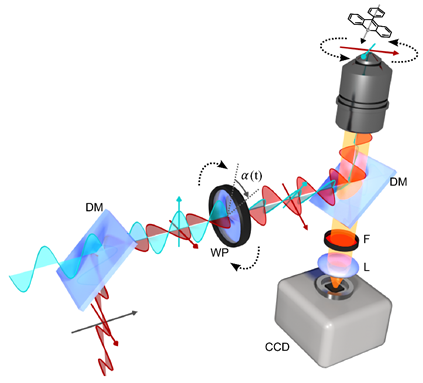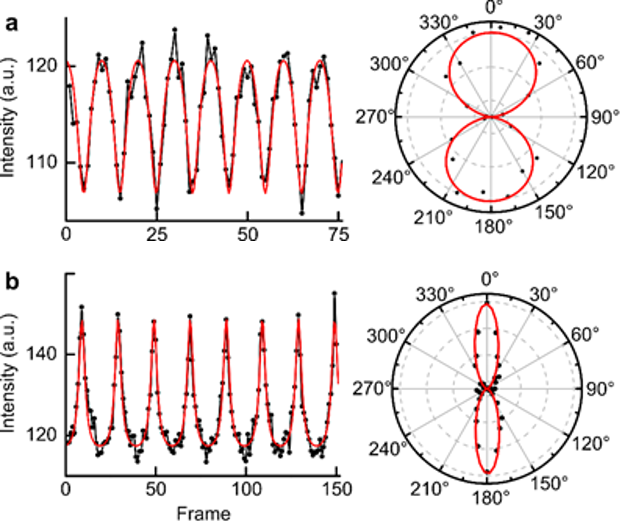In general, the detection of fluorescence polarization is an extremely widespread approach to gain important mechanistic or structural insights from fluorescenctly labelled samples. Binding interactions are very widely monitored using fluorescence polarization. Also, important structural information can be derived from fluorescence labels when they have different preferred orientations at different structural regions. Active sites that are undergoing conformational changes can be monitored in real time when rigidly attached labels maintain their relative orientation. However, the fluorescence emission of emitters having a fixed orientation generally follows a rather unspecific cos²- angle dependence (Figure). As a matter of fact, overlapping emissions of several different emitters of different angles will always lead again to a cos²- angle dependence as mathematically adding cos² functions of different phases will again lead to a cos function.

In order to generate much more specific fluorescence polarization signals from emitters of distinct orientation we have developed excitation polarization narrowing (ExPAN). It is based on the additional irradiation of fluorescently labelled samples with a de-excitation beam with a polarization perpendicular to the excitation polarization. Thereby, all fluorophores are de-excited that have not the exact same orientation as the excitation polarization orientation. As a result, the fluorescence emission of emitters having a fixed orientation follows a very specific angle dependence (Figure). In contrast to normal polarized fluorescence excitation, this specific angle dependence of the fluorescence emission contains information about various emitters of different orientations even when their signals are overlapping.

In future developments, polarized excitation in three-dimensions will provide even richer information about the three-dimensional orientation of the underlying structures.
Research Groups
Hohm Group
Jacob Group
Kozuch Group
Maul Group
Proppe Group
Tschierlei Group
Walla Group
Associated Groups
Muñoz Group (GRS)
Emeriti
Becker Group
Gericke Group
Personnel
Institute Director
Executive Board
Staff
Facilities
Workshop
School lab (G)
Agnes Pockels lab
Documents
Institute Rules (G)
Operation Manuals
Laser safety
Emergency leaflet
Campus Map (G)
Events Calendar (G)
TU Public Announcements
Whistle Blowing (G)
Ticket GITZ (G)
Ticket Facilities Management (G)
Energy Web Portal (G)
(G) German only
